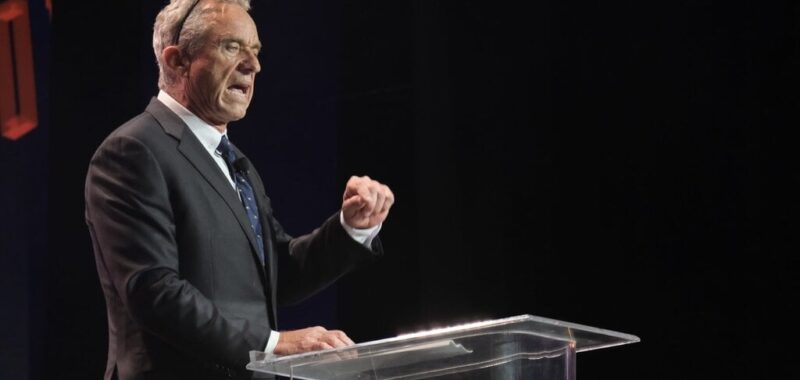The twice-disputed outcome of a Polymarket contest involving Robert F. Kennedy Jr. has proven controversial and remains unresolved. And some traders have leveraged the fracas online to stage long-shot bets around the independent presidential candidate’s suspended campaign.
Before Kennedy spoke about the future of his White House bid in Arizona on Friday, a market on the blockchain-based prediction platform had garnered $300,000 in total bets. The contest looked to assess Kennedy’s odds of dropping out by Friday, penciling in a 90% chance.
Three days later, the market has yet to be resolved, with $6.3 million in total wagers cast. As of this writing, a “final review” was set to conclude within the next seven hours, determining the fate of positions that were mostly taken up after Kennedy’s decision to put his campaign on pause.
At one point Friday, Kennedy’s odds of dropping out Friday nosedived to a 6% chance, before edging back up to a near 100% chance after the initial confusion spread.
Prediction platforms have skyrocketed in popularity this year, as a divisive U.S. presidential election has spurred record bets on Polymarket’s platform. At the same time, the increased popularity has shed a spotlight on how platforms reach a consensus after users cry foul.
Polymarket leverages the UMA Protocol to resolve markets when users disagree with a market’s outcome. Effectively, holders of UMA tokens are tasked with voting on which outcome is true when a market is disputed, aided with arguments from UMA’s Discord server.
The process has played out twice already, with UMA token holders finding that Kennedy did indeed drop out Friday. But as the contest neared its third and final review, some users focused on the fact that Kennedy said his name “will remain on the ballot in most states.”
“RFK himself has said to vote for him if you’re not in a battleground state, because he could still become president from a contingent election,” Discord user gabester2133 argued.
Kennedy himself said Friday that he’s not “terminating” his campaign, but his campaign would remove his name from the ballots in swing states where his presence could disrupt Republican candidate Donald Trump’s chances of winning. The independent challenger endorsed Trump on Friday; both are outspoken Bitcoin supporters.
Arguing the market should resolve “Yes” on Friday, Polymarket itself pointed to a “consensus of credible reporting” stating Kennedy ended his presidential campaign. But that didn’t stop some users from scooping up “No” shares after Kennedy’s campaign was suspended.
One Polymarket user wagered $5,000 that Kennedy is still in the race, for example, while another user dropped $920 on the independent presidential candidate. Most bets taken in the aftermath of Kennedy’s Friday speech affirmed that the politician had indeed dropped out.
Meanwhile, a “final outcome” has been reached in two separate Polymarket contests, which found that Kennedy indeed dropped out Friday. Drawing just over $1 million in total bets, the wagers tracked the life of Kennedy’s campaign through August and October.
On UMA’s website, participation metrics showed that 15 million tokens had been allocated in the final review of Friday’s Kennedy-focused market. And with 12 million in UMA tokens placed toward “Yes,” it appeared the market’s initial two outcomes would ultimately be upheld.
Even though Kennedy insisted Friday that he wasn’t “terminating” his campaign, Polymarket has leaned on the “spirit of the market” when clarifying other wagers. In June, for example, Polymarket argued that LayerZero had indeed conducted an airdrop, even though the project described its token distribution process as being donation-based.
For some users that had bet on Kennedy’s campaign, the initial outcome didn’t appear correct, with UMA token holders potentially swayed by Polymarket’s clarification.
“This left a bad taste in my mouth,” a Polymarket user named MediationsFund commented. “Note to self: Never bet against an initial proposed outcome even if you know it to be wrong.”
Edited by Andrew Hayward

